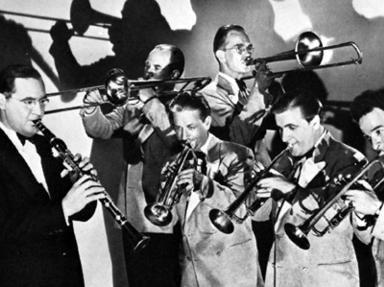Quiz Answer Key and Fun Facts
1. All Americans know that our old friend, Yankee Doodle who went riding into town, did something a little odd. When he arrived, he "stuck a feather in his cap and called it macaroni". What?
I mean we've all heard this ditty since early childhood, but when we asked, "why macaroni?", we only encountered dumb looks or were just told that it was a silly rhyme designed to go with pony.
So, I'll ask again; why a feather called macaroni worn by a yankee doodle?
2. "Whoopee ti yi yo, git along, little dogies,
It's your misfortune and none of my own,
Whoopee ti yi yo, git along, little dogies,
For you know that Wyoming will be your new home. "
In this classic Americana song from the old west what was a "dogie"?
3. Well; since I am from the southern U.S., I feel the urge to include a question about my region and its cultural background. For better or for worse, slavery was an integral part of the South, and while not justified today, neither can it be denied. The following lyrics are from an old Stephen Foster song that dates back to 1851, and many people think the name of the song is "Swanee River."
Ah, but not so. What is the actual title of the following tune?
(which is NOT reproduced here in its original dialectical form.)
"Way down upon the Swanee River,
Far, far away.
That's where my heart is turning ever.
That's where the old folks stay.
All up and down the whole creation,
Sadly I roam,
Still longing for the old plantation,
And for the old folks at home..."
4. What father and son recorded these two classic American tunes, one in 1944 and the other in 1970, respectively?
"This land is your land, this land is my land
From California, to the New York Island
From the redwood forest, to the Gulf stream waters
This land was made for you and me."
_______________________________________________________
"Good morning America, how are you?
Don't you know me? I'm your native son;
I'm the train they call The City of New Orleans,
I'll be gone five hundred miles when the day is done."
5. What four words fit into the following verse? Hint: think "Amarillo".
"Her eyes are bright as di'monds,
They sparkle like the dew.
You may talk about your dearest May
and sing of Rosa Lee,
But the...
Beats the belles of Tennessee."
6. See if you can select the correct female name that fits with these lyrics, from a song written in 1884. (Noticeably absent is the chorus.)
The song is about a bereaved lover who lost his girl in a drowning accident.
"In a cavern, in a canyon,
Excavating for a mine
Dwelt a miner forty niner,
And his daughter..."
7. This is the third verse of a popular American folk-song. Can you tell what young lady is being referred to in this tune?
"I soon will be in New Orleans and then I'll look around
And when I find my gal ..., I'll fall upon the ground
But if I do not find you there, then I will surely die
And when I'm dead and buried, ... don't you cry. "
8. Who popularized the following song, lending itself to the notion of literally "singing for one's freedom"?
"Last Saturday night I got married,
Me and my wife settled down;
Now me and my wife have parted,
I'm gonna take a little stroll downtown.
Irene good night Irene good night,
Good night, Irene, Good night, Irene,
I'll see you in my dreams."
9. This tune was originally entitled "In the Bright Mohawk Valley", a tune that was popular in New York. It spread throughout the South and cowboys helped it become the tune that we are familiar with. If I give you the first verse can you tell me the name that most people know this tune by today?
"From this valley they say you are going;
We will miss your bright eyes and sweet smile;
For they say you are taking the sunshine;
That has brightened our path for a while."
10. Probably a very familiar song to most Americans, the lyrics to this song were written by a man who, incredibly, had never attended a baseball game. The man who wrote the music never had been to one either. Can you name the men who wrote the music and lyrics to this song?
"Take me out to the ball game,
Take me out with the crowds;
Buy me some peanuts and Cracker Jack,
I don't care if I never get back.
Let me root, root, root for the home team,
If they don't win, it's a shame.
For it's one, two, three strikes, you're out,
At the old ball game. "
Source: Author
logcrawler
This quiz was reviewed by FunTrivia editor
ertrum before going online.
Any errors found in FunTrivia content are routinely corrected through our feedback system.


